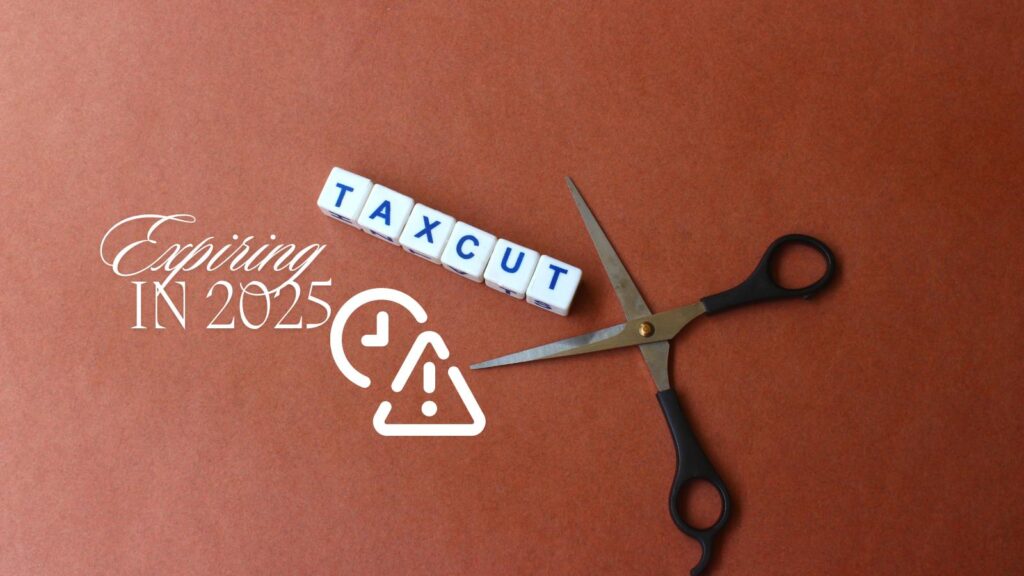Have you been wondering what tax cuts expiring in 2025 will mean to you, a small business owner, and your business? I have, and will continue to, share what I’ve learned about them as we enter 2026.
Knowing what you can do now to prepare for the new year will help your small business get ready for these changes. The expiring tax cuts will significantly impact your business’s finances. (The typical American family will get up to $10,900 in additional take-home pay.)
Table of Contents
Overview of Tax Cuts Expiring in 2025
Several key tax cuts, including changes in individual and corporate tax rates and various deductions and credits, were set to expire in 2025.
These changes could affect your business’s financial health and operations, mainly for the better, with the Big Beautiful Bill passed in July.
Individual Tax Rates and Their Impact
If your small business is a pass-through entity, changes in individual tax rates will directly impact your income. Pass-through entities like sole proprietorships, partnerships, and S corporations benefit from lower personal tax rates.
However, these rates are scheduled to increase, potentially leading to higher taxes on your business income.
What Tax Cuts Expiring in 2025 Will Do For Corporate Tax Rate Changes
While many small businesses are pass-through entities, some are structured as corporations. The corporate tax rate, which was lowered to 21% in recent years, will remain at 21% with the Big Beautiful Bill passed in July of 2025.
Since I started my own small business in 2017, I knew I needed to save 35% of my business income to pay taxes. I had to prepare to save at least 45% and cut expenses by 10% to avoid losing income.
After all, we are in business to make money, not to give it all away in taxes. We just did our taxes; my husband owns an S Corp, and I have an LLC, and we had to pay more after doing the quarterlies for my business.
Not only that, but not all of our deductions could be used, and we weren’t told til after we got our return. So, we found a new accountant for next year.
She will meet with us several times a year so we can be prepared for any changes that may occur. I’ve heard from other business owners that they also use a bookkeeper, which is something to keep in mind.

Deductions and Credits Affected
Several vital deductions and credits for small businesses are also set to expire. These include Section 179 expensing and the Qualified Business Income deduction.
Section 179 Expensing
Section 179 allows you to expense the cost of new equipment in the year it is purchased rather than depreciating it over several years. This expensing limit will be reduced after 2025.
Without this benefit, making immediate investments in new machinery or equipment might be harder, which can hinder growth and efficiency.
What Tax Cuts Expiring in 2025 Mean For Qualified Business Income Deduction
The Qualified Business Income (QBI) deduction allows eligible businesses to deduct up to 20% of their qualified business income. This deduction is particularly beneficial for pass-through entities.
What Tax Cuts Expiring in 2025 Mean for Small Business Owners
Consider proactive strategies and thorough planning to slow the effects of expiring tax cuts.
Financial Planning and Tax Consultation
Engage with your tax professional to understand how these changes impact your business.
Your tax consultant can help you identify the best strategies to minimize tax liabilities and take advantage of any remaining benefits before they expire.
What Tax Cuts Expiring in 2025 Mean for Reassessing Business Structures
Evaluate your current business structure. Depending on the impending tax changes, it might make sense to reorganize, or tax brackets can be adjusted if necessary.
For example, switching from a pass-through entity to a corporation, or vice versa, could result in better tax outcomes based on future rates and deductions.
However, making these changes between an accountant and a lawyer may cost you some money.
Conclusion: What Tax Cuts Expiring in 2025 Will Mean For You and Your Small Biz
The expiration of tax cuts in 2025 presents significant challenges for small businesses. By understanding the potential impacts on individual and corporate tax rates, as well as the loss of crucial deductions and credits, you can take steps to prepare.
Proactive financial planning and possibly reassessing your business structure will help you navigate these changes and maintain your business’s economic health in the coming months and years.
FAQS: What Tax Cuts Expiring in 2025 Mean: What Small Businesses Need to Know
What tax cuts expiring in 2025 are key?
Several tax cuts from the 2017 Tax Cuts and Jobs Act (TCJA) were set to expire. Key provisions include reducing the corporate tax rate, the pass-through business income deduction, and expanded Section 179 expensing.
How will the expiration affect corporate tax rates?
The corporate tax rate, which was lowered to 21% under the TCJA, was set to increase. Thankfully, the Big Beautiful Bill was passed in July to avoid this.
What about Section 179 expensing?
Bonus depreciation, which allows businesses to deduct a substantial percentage of the cost of qualified property upfront, will phase out when the tax cuts expire in 2025.
The “One Big Beautiful Bill Act” was signed into law on July 4, 2025. It permanently reinstated 100% bonus depreciation for qualifying property. That’s a wonderful thing for small businesses.
How will the individual tax rates impact small business owners?
Individual tax rate cuts are also set to expire. The act maintained a seven-bracket structure for personal income tax but lowered most rates, including reducing the top marginal rate from 39.6% to 37%. These individual rates were initially set to expire at the end of 2025 but were made permanent by the OBBBA.
Are there any expected changes to tax credits?
Some business tax credits, such as the research and development (R&D) credit, may be reduced or phased out. This was avoided with the bill’s passage in July.
What should small businesses do to prepare for what the expiring tax cuts 2025 will do?
Small businesses should consult with a tax advisor to understand the specific impacts on their finances. To mitigate the effects, consider strategies like accelerating income or deferring expenses.




